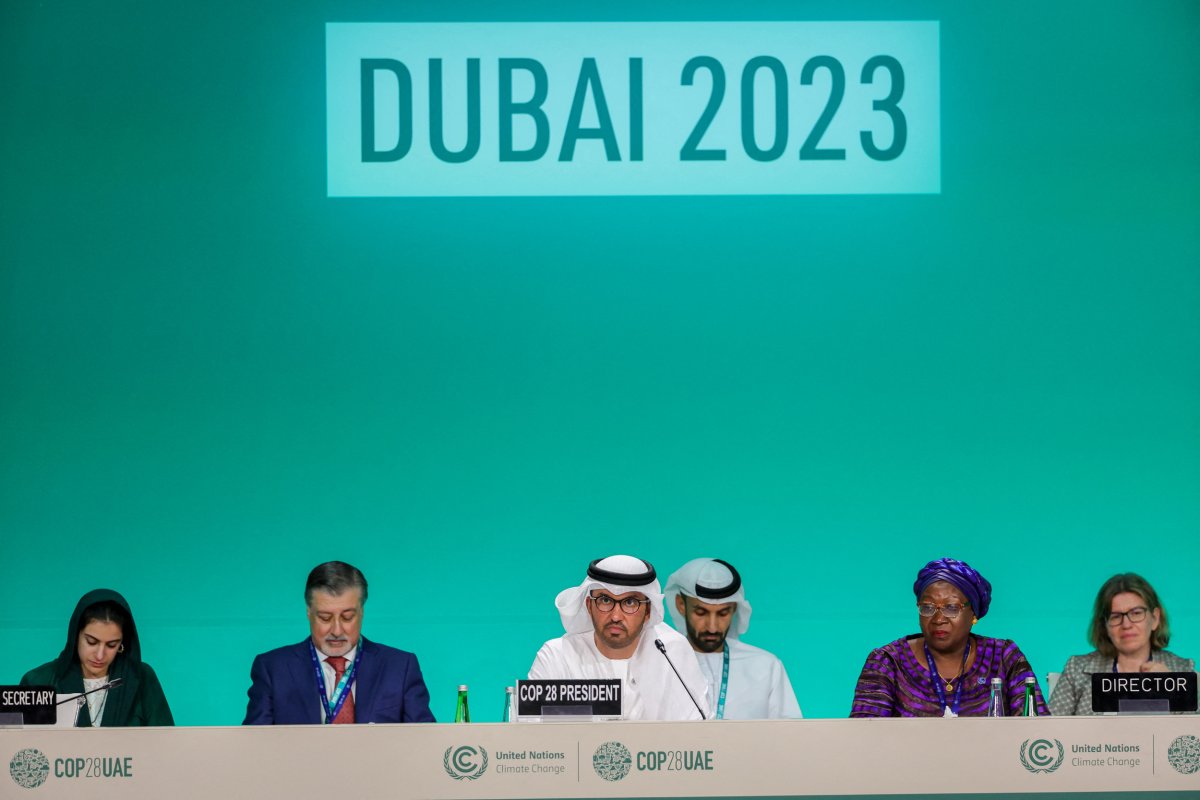It took nearly three decades, but with COP28, the annual United Nations talks on climate change have for the first time called for a transition away from fossil fuels, the root cause of climate change.
After an extra day of negotiations in Dubai, delegates at COP28 on Wednesday adopted a final document that "calls on" nations to participate in "transitioning away from fossil fuels in energy systems."
As he gaveled the two-week session to a close, COP28 President Sultan Ahmed Al Jaber called it a "historic" result that "puts the world back on track to keeping 1.5 within reach."
In their 2015 Paris Agreement, participating countries committed to limit warming beyond pre-industrial levels to "well below" 2 degrees Celsius (3.6 degrees Fahrenheit) and to pursue efforts to limit warming to 1.5 degrees Celsius (2.7 degrees Fahrenheit).

The U.N.'s top climate official said the COP28 declaration still fell short of the clear signal needed to phase out fossil fuels.
"We didn't turn the page on the fossil fuel era in Dubai, but this outcome is the beginning of the end," U.N. Climate Change Executive Secretary Simon Stiell said in his closing comments.
Critics pointed out the weak language in the COP28 document—"calls on" is among the tamest terms diplomats can apply—and phrasing that assumes continued use of fossil fuels with unproven technology to contain CO2 emissions.
"The influence of petrostates is still evident in the half measures and loopholes included in the final agreement," former Vice President Al Gore said in a statement on X, formerly Twitter. Gore said the inclusion of fossil fuels was "an important milestone" but also "the bare minimum we need."
Gore and other critics had claimed from the start that COP28 was co-opted by fossil fuel interests. A watchdog group found a record number of fossil fuel lobbyists among this year's COP attendees, and host country United Arab Emirates is among the world's largest oil producers. COP28 President Sultan Al Jaber leads the UAE's national oil company, an apparent conflict of interest.
And yet, the conference made progress on several fronts in the climate fight. Countries agreed to triple the pace of clean energy deployment, committed to new funding for nature-based solutions and climate-resilient food systems, and placed an unprecedented emphasis on the health impacts of climate change.
Here's an assessment of what COP28 accomplished and a reality check on what's needed to avoid the worst warming.
Climate Funding
Regardless of the language in the final documents, the decisions on funding will largely determine what action results from COP28, and climate financing dominated much of the discussion.
COP28 delegates took care of some important unfinished business in the opening days of the talks when they established a "Loss and Damage" fund to assist lower income countries that are suffering the first and worst effects of climate change.
Last year's gathering ended in a stalemate on the matter, so setting up the fund was an important step. But there was only about $700 million dedicated to the fund by the conference's end, far short of funding targets, according to Dan Jasper, a policy adviser at the climate solutions research group Project Drawdown.
"We wanted to see some urgency from rich countries to finance this," Jasper told Newsweek. "But there is quite a bit of pushback, especially from the U.S."
COP28 officials said the U.N. Green Climate Fund, which was established in 2015 to assist developing countries with clean technologies, got a boost. Thirty-one countries are now contributing, and total pledges to the fund now stand at nearly $13 billion. However, that is again far short of the estimated need.
"The U.S. is giving paltry sums," Jasper said. Overall, he said, he gives COP28's financing efforts a barely passing grade.
"The climate's not going to grade you on a curve, and neither are future generations," he said.
Natural Solutions
Earth's oceans, forests and other ecosystems absorb massive amounts of CO2, and COP28 focused on ways to support these natural climate solutions while slowing the loss of habitats and biodiversity.
"Addressing the climate and nature crises boldly and jointly is the only hope for a livable planet," Campaign for Nature Director Brian O'Donnell told Newsweek via email.

According to COP28 officials, countries produced more than $2.5 billion in financing to protect and restore natural systems, and dozens of countries joined a project to expand and preserve mangroves.
Shoreline mangrove forests provide a two-part climate benefit, not only drawing down and storing CO2 but also providing coastal communities with a natural buffer against surging waters during tropical storms.
O'Donnell said he was encouraged by the prominence given to nature at COP28 but dismayed by the financing.
"The lack of a clear climate finance plan, and the underwhelming amount of resources pledged for nature and climate action is disconcerting," he said. Wealthy nations have pledged $20 billion a year for natural protections, he said, but made little progress toward that goal.
COP28 also included an unprecedented emphasis on agriculture, which is responsible for as much as 30 percent of global greenhouse gas emissions, according to the U.N. Food and Agriculture Organization. Countries committed to support more climate-resilient food systems and to start including agriculture in their emissions reductions plans.
Healthy Focus
COP28 was the first of the U.N.'s climate gatherings to devote a full day to the health impacts from climate change.
"We saw incredible progress in ensuring that people understand the very profound impacts of climate change on our daily lives and on our health and well-being," Dr. Vanessa Kerry told Newsweek. An associate professor at Harvard Medical School, Kerry leads the nonprofit organization Seed Global Health and was named a special climate envoy by the World Health Organization.
Kerry said COP28 helped drive home the connections between climate change, extreme weather and health threats that follow floods and storms in the world's least developed nations.

"Whether it is cholera, dengue or malaria, all of it is going to undermine development," she said. "They are stuck in these cycles of poverty and instability because they're being undermined by growing health challenges."
But again, funding is the crux of the matter, and Kerry was disappointed by the "massive funding gap" between the amount pledged to climate health impacts and the estimated need.
Reality Check
Scientists predict that 2023 will almost certainly be the hottest year on record. Warming is happening so fast, University of Exeter and Met Office Hadley Centre professor of climate impacts Richard Betts said, that even the guiding documents that negotiators at COP28 used were incorrect.
"The text gives observed warming as 'about 1.1 degrees Celsius,' but this is already out of date," Betts said in a statement Wednesday. "The actual current global warming level is about 1.3."
Al Jaber called the Paris Agreement's 1.5 degree target his "North Star." But several prominent scientists have said that the combination of rapid warming and slow change to the global energy system makes it unlikely that the world can meet that ambitious limit.
"It's so completely out of the picture that it's laughable," Harvard University geology and environmental science professor Dan Schrag told Newsweek. "I would love to see a miracle and magically everybody stops using fossil fuels, but I'm too much of a scientist to be taken up by the delusion."
Schrag predicts that the world will likely pass the 1.5 degree Celsius limit within the next ten years. But he said it is important to keep in mind that the target set by the Paris Agreement is not an end point. Each degree of warming is critical.
"I'm terrified that when we blow through 1.5, people are going to think 'Oh we lost,' and give up," he said. "The fact is there's never a point where you give up."
About the writer
To read how Newsweek uses AI as a newsroom tool, Click here.



